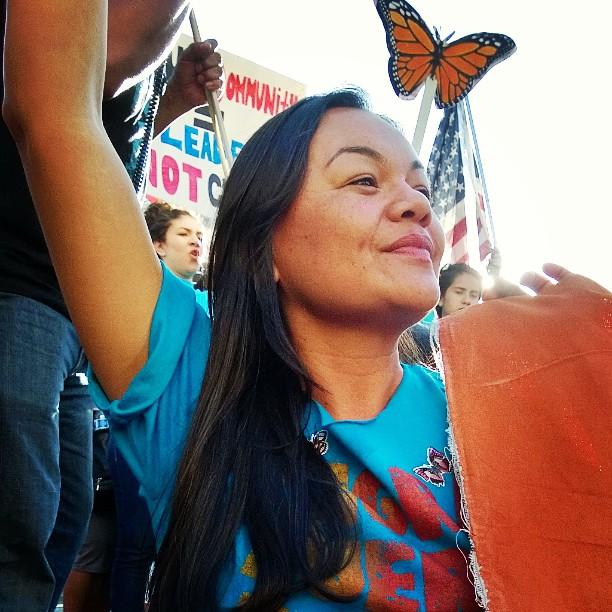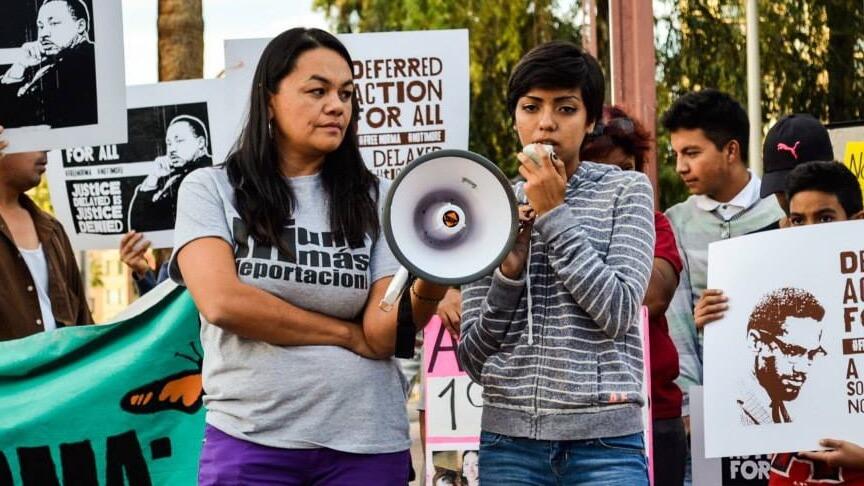Editor’s note: This article was produced as a project for the Dennis A. Hunt Fund for Health Journalism, a program of the USC AnnenbergCenter for Health Journalism’s 2020 National Fellowship.
Like many therapists, Lu Rocha uses breathing techniques, meditation and yoga in her practice, but she also asks clientsabout their personal beliefs: “What stories have you heard about in your own family, your own community, what did they do for healing?”
Some tell her that they pray with a rosary. Others, from parts of Latin America, say their grandmothers used to rub an egg on their bodies to ease headaches. They believe the egg absorbs negative energy. Rocha gets it — her parents are from Mexico. She also gets what many of her clients have faced — years of the Trump administration’s tough immigration policies.
“…[T]hese past four years is trauma just about every week. And my people are tired, my people are sick, my people are dying.”
“When I was 5 or 6 years old, I walked around with my birth certificate because raids always happened and pickups with the immigration always happened,” said Rocha, who lives in Chicago. “But this is different this time; these past four years is trauma just about every week. And my people are tired, my people are sick, my people are dying.”
Rocha is a member of the Latinx Therapists Action Network, which now has a presence in 20 US states. To take part, therapists must be committed to supporting immigrant communities and the movements allied with them.
Deportations, family separation and detention have long taken a toll on the mental health of many immigrants in the US, along with the advocates who defend them. But the pandemic and uncertainty about immigration policies have magnified inequalities that were already present for marginalized communities, compounding their trauma.
Related: The pain of family separations is still being felt. What could Biden do?
Rocha has seen this firsthand over the past four years but especially leading up to the 2020 presidential election.
“I had DACA [Deferred Action for Childhood Arrivals] recipients and we were creating safety plans,” said Rocha who specializes in trauma, serving communities of color and immigrants.
She also had pregnant clients who were undocumented and fearful that if they were to get deported, there wouldn’t be anyone to care for their children.
Related: Challenges await the distribution of a COVID-19 vaccine
“This is the reality for my people,” Rocha said.
Therapy can be too expensive for uninsured undocumented immigrants — that’s why some of the therapists in the nationwide network offer sliding-scale fees regardless of immigration status. Historically, these services are not easy to come by for uninsured patients, and especially for those who are undocumented immigrants with very limited options.
Before the pandemic, 93% of Latinos who suffered from mental illness or substance abuse were not getting treatment, according to the latest survey from the Substance Abuse and Mental Health Services Administration.

Francisca Porchas, a longtime immigration rights activist, created the therapists’ network in 2019. Porchas’ fight against deportation and immigration detention with groups like the Puente movement in Phoenix exposed her to a lot of trauma, and she realized that suffering affected activists, too. But there weren’t any healing support networks.
“I’m an organizer. I know how to bring people together,” she said about her idea. “And so I want to bring healers, therapists, different types of folks together to really support and bring the kind of resources to the community that’s needed,” she said.
Over two years, Porchas got 84 therapists to join the network. It took time to find therapists who are, in some cases, immigrants themselves and might understand what it is like for someone to experience deportation.
Related: Addressing mental health toll of hurricanes in Honduras
For Porchas, healing is political and when therapists stand up against homophobia, racism and discrimination, it makes a difference. Without that understanding, there’s a risk that someone who needs help might give up. That almost happened to Rey Wences, 29, a human rights organizer in Chicago. Wences didn’t feel understood by therapists in the past. “I had to do a lot of background explaining the context of immigration law. Spending that time talking about immigration policy and just like demystifying some of the misconceptions that this therapist had,” Wences said.
Listen to a version of this story in Spanish here.
Wences heard about the Latinx Therapists Action Network through Porchas and found a therapist who stuck because of shared values.
Related: Mental health concerns for students of color heightened amid pandemic
The network is also working to expand its reach online through workshops. Recently, they held a Facebook Live event with therapist Brenda Gándara, hoping to connect with Spanish speakers. Gándara spoke about anxiety and provided grounding techniques to some of the participants. A few wrote in the comments section online that they had experienced anxiety and stress, and others asked for techniques to help teenagers facing it. Over 500 people have viewed the Facebook session.
This past summer, the therapists got a request from Siembra, an immigrant rights group in North Carolina, that said its community was overwhelmed with grief, fueled by the pandemic, job losses, evictions and anxiety about immigration enforcement.
Sandra, 40, who had to quit her restaurant job to care for her children now at home for school, connected with the network through a workshop organized for Siembra. Sandra, originally from Mexico, asked to use her first name only because she’s undocumented.
“If I go to the store and the police pull me over and I get deported? And I’m jobless. So many things, the stress became unbearable.”
“If I go to the store and the police pull me over and I get deported? And I’m jobless. So many things, the stress became unbearable,” she said in an interview in Spanish.
Related: Stockholm’s mental health ambulance could help the US rethink policing
Sandra got depressed when the pandemic started, and she felt anger toward her four children. Because she lives in a rural area, she couldn’t find a Spanish-speaking therapist who understood her culture and circumstances.
Through the Latinx network, she attended a workshop and learned breathing techniques. A therapist also described her anxiety in a manner no one had before, using words she understood. She was also reminded of more traditional ways to heal, like connecting with her ancestors. Sandra liked that suggestion. Now, every few weeks, she pours herself a cup of tea, and talks to her deceased grandmother and mom, as if they were at the table with her.
“With that cup of tea, I can have long conversations with them, even if they’re not here,” she said. They still exist in her mind and they’ll never leave her, she said. “They are my respite, my connection and my peace,” she said.
